Benchmarking Visit to Kiama and Ng’ate Primary Schools
Date:12/09/2024
Benchmarking Visit to Kiama and Ng’ate Primary Schools with Erick Lepaso from Engape Foundation
Participants: Peter Ngugi, Josephine Nganga, Salome Kamau, Esther njoki, Erick Lepaso (Engape foundation)
On 12th September, we conducted a benchmarking visit to Kiama and Ng’ate Primary Schools with Erick Lepaso, a representative of the Engape Foundation, (Engape is a Maasai name that translates to “shield”). This foundation, founded in 2019, operates with a mission to rescue girls from early marriages and female genital mutilation (FGM) in Kajiado, offering them refuge and education at the AIC Girls School and Rescue Center in Isinya. Erick’s involvement in this visit provided a unique opportunity to exchange insights on our work with children in vulnerable situations, creating space for future collaborations. The purpose of the visit was to assess the progress of Watoto Kwanza’s interventions at both schools and to explore how lessons from the programs could potentially support the initiatives of the Engape Foundation.
Visit to Kiama Primary School:
- Strengthening Nutrition and Education
The visit to Kiama Primary School provided a glimpse into the continued impact of the porridge program and sanitary pads distribution program that Watoto Kwanza Kenya has been running. These initiatives aim to tackle food insecurity and menstrual health issues among students, especially in rural areas where access to such basic necessities is limited.
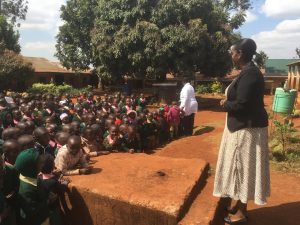
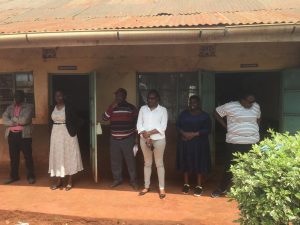
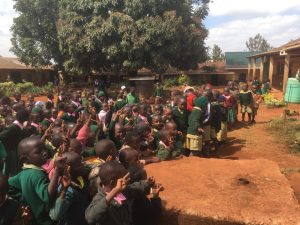
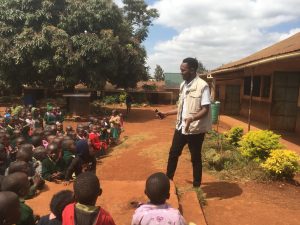
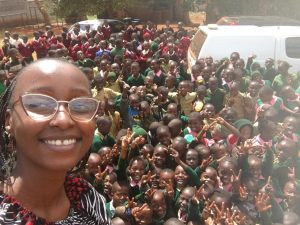
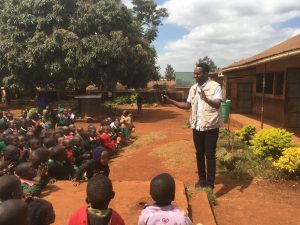
- Porridge Program:
We observed the morning porridge distribution, which remains a cornerstone of support for many students at Kiama. This program ensures that children receive a nutritious meal at school, which is crucial for their physical development and academic performance. The program’s long term impact has been visible in improved class attendance and student concentration, as several teachers attested. For many families in the community, this meal relieves the burden of providing daily sustenance, allowing children to focus more on their education. - The students shared their appreciation, with some mentioning how the porridge has not only kept them healthy but also provided energy to participate actively in class and school activities. Many students carry portions home to their siblings, showcasing the program’s broader familial impact.
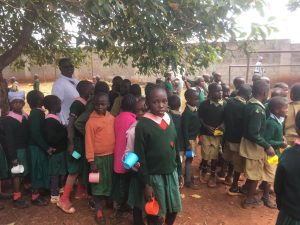
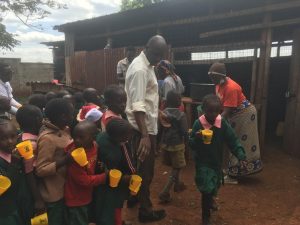
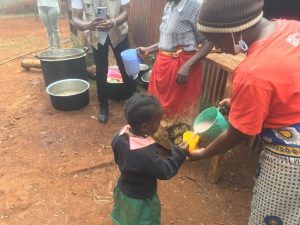
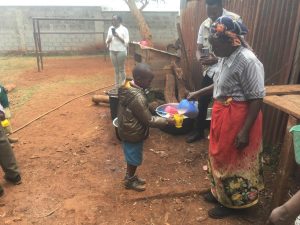
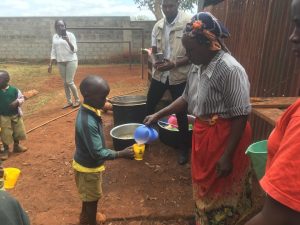
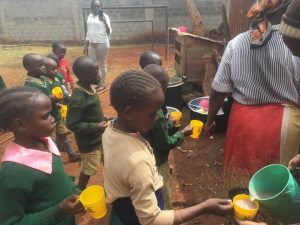
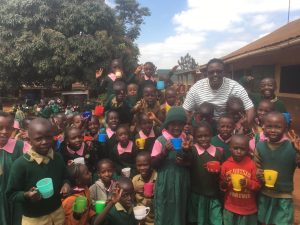
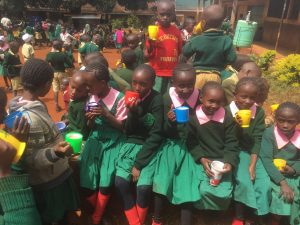
- Sanitary Pads Distribution Program:
The sanitary pads distribution continues to provide a lifeline for girls in grades 6 through 8, enabling them to manage their menstrual cycles with dignity. The availability of pads has significantly reduced absenteeism among girls, who previously had to miss school during their periods. During our visit, we distributed pads to the girls, who expressed gratitude for this essential support. Several students shared how access to sanitary pads has allowed them to focus on their studies without the fear of embarrassment or discomfort.
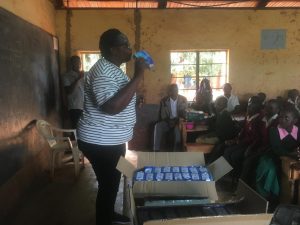
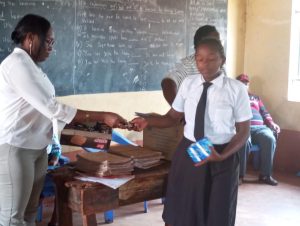
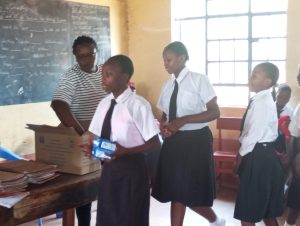
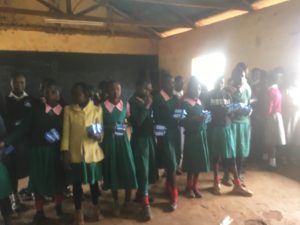
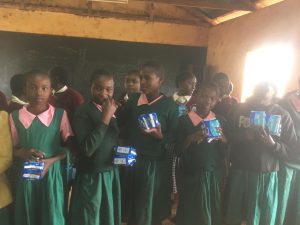
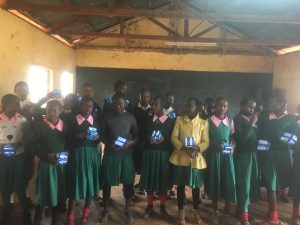
- Educational Session:
We conducted a lively forum with both boys and girls, discussing the following topics:
• Personal hygiene: Emphasizing cleanliness and its importance in health and self-esteem.
• Peer pressure: Helping students navigate social pressures with confidence and
assertiveness.
• Goal setting: Inspiring students to set achievable goals for their academic and personal
growth.
The students were highly engaged, asking thoughtful questions about their futures and sharing their personal experiences with peer pressure. We also discussed the importance of self-respect and mutual support, particularly in destigmatizing menstruation, where boys were encouraged to be allies to their female peers.
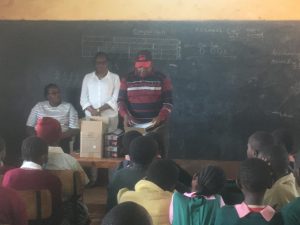
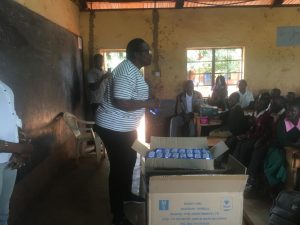
- Community Involvement:
A particularly touching moment was when members of a neighboring Catholic church arrived to donate dry foodstuffs to the school. This gesture of goodwill was warmly received by both the school and our team, as it signaled the growing community involvement in supporting the wellbeing of the students. The donation supplements the porridge program, ensuring that children have an additional source of nutrition. Witnessing this collective responsibility reaffirmed our belief that local partnerships are key to sustaining these vital programs.
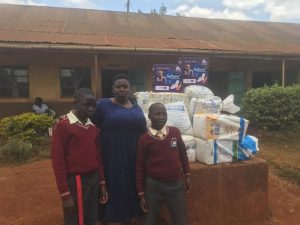
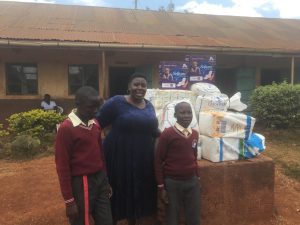
Visit to Ng’ate Primary School: Building on Past Contributions
At Ng’ate Primary School, we observed the lunch program and sanitary pads distribution program in action. Both programs have made substantial contributions to the students’ wellbeing, addressing hunger and menstrual health issues that were previously barriers to education.
- Lunch Program:
The lunch program at Ng’ate has proven to be a crucial intervention. As teachers shared with us, many students rely on this meal, as they often come fromhouseholds where food is scarce. The program has drastically reduced absenteeism and improved students’ ability to concentrate in class. The students themselves spoke about how having a reliable meal at school allows them to focus more on their studies without worrying about where their next meal will come from. Some even take portions home, helping to support their siblings and families.
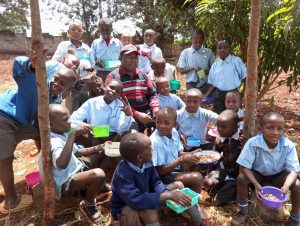
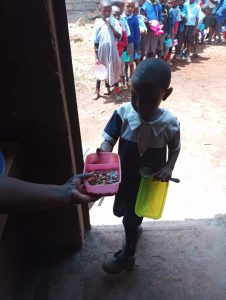
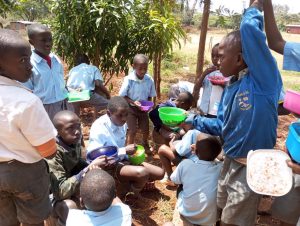
- Educational Session:
At Ng’ate, we conducted a similar educational session to the one held at Kiama, discussing hygiene, peer pressure, and goal setting. The students here were equally enthusiastic, sharing how these discussions made them reflect on their personal challenges and aspirations. One student mentioned how the conversation on goal setting helped him see beyond his immediate circumstances, inspiring him to dream big despite the limitations around him.
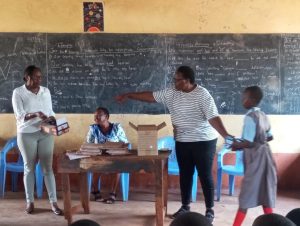
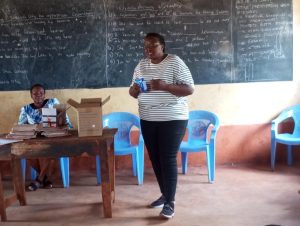
- Sanitary Pads Distribution:
We also distributed sanitary pads to the girls, who were deeply grateful for this support. Many of them highlighted how the pads program has allowed them to stay in school consistently, no longer worrying about missing classes during their periods.
- Observation of Donated Clothes:
During our visit, we noticed the children proudly wearing clothes donated back in July by friends from Ireland. The clothes have had a visible impact on their self-esteem, with teachers sharing how students have become more confident since receiving the donations.
The students themselves expressed pride in how they looked, with some sharing stories about how other schools often comment on their appearance during competitions. The sight of the students in these clothes was heartwarming, reflecting the far-reaching impact of such seemingly small gestures of kindness.
- Fun and Cultural Exchange Activities
A highlight of the visit was the cultural exchange led by Erick Lepaso. Erick introduced the students to Maasai greetings and demonstrated the traditional Maasai jump, a cultural symbol of pride and athleticism in Maasai communities. The students enthusiastically joined in, with
everyone laughing and competing to see who could jump the highest. This fun activity brought a sense of joy and connectedness, allowing students to learn about Maasai culture while fostering a spirit of inclusivity and unity.
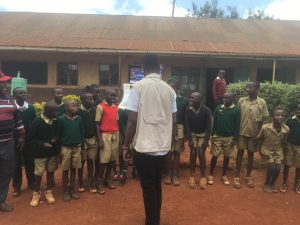
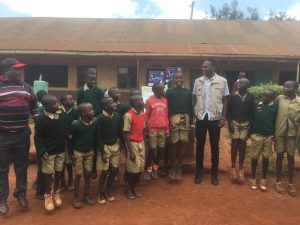
- Student Reflections on Program Impact
Throughout the visit, we took time to interview students about how these programs have affected them. The feedback was overwhelmingly positive:
• Many noted improvements in their health and energy levels, which have helped them perform better in class.
• The availability of porridge and lunch has eased the pressure on their families, who often struggle to provide meals.
• The pads program has had a transformative effect on the girls, boosting their confidence and keeping them in school consistently.
Students spoke candidly about how these programs have not only improved their academic performance but also changed the dynamics at home, as they can now share food with their siblings or worry less about their menstrual cycles affecting their education.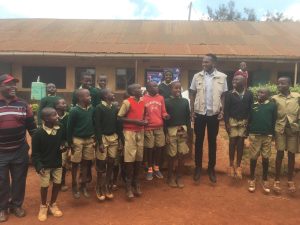
Reflections from Erick Lepaso
Erick Lepaso, who is deeply involved in rescuing girls from early marriages and FGM through the Engape Foundation, was moved by the visit. He remarked on the liveliness of the students and the evident connection between teachers and pupils. He was particularly struck by how the programs at both schools have genuinely transformed the students’ lives. Erick shared a word of encouragement with the students, emphasizing how fortunate they were to have such strong support systems in place. He drew a comparison with the schools in Kajiado, noting how far these programs have come in addressing not just the educational needs but the holistic wellbeing of the students. Erick expressed his desire to collaborate further with Watoto Kwanza in the future, seeing these programs as a model that could be applied in other regions to benefit even more children.
Acknowledgement of Support: Gratitude to the African Child Foundation We would like to extend our heartfelt gratitude to our generous sponsor, the African Child Foundation, for their unwavering support. Your continued contributions have made it possible for us to sustain vital programs such as the porridge, lunch, and sanitary pads distribution in schools. These initiatives are transforming the lives of countless children by improving their health, education, and overall well-being. We deeply appreciate your partnership, and we look
forward to working together to make an even greater impact in the future. Thank you for being a crucial part of this journey!
Conclusion
This benchmarking visit with Erick Lepaso was an enriching experience, highlighting the sustained impact of Watoto Kwanza’s programs at Kiama and Ng’ate Primary Schools. The porridge, lunch, and pads programs have significantly improved the lives of the students,
addressing both their physical and emotional needs. Erick’s reflections underscored the importance of community-driven efforts and the potential for future collaborations between Watoto Kwanza and the Engape Foundation. We are grateful to Erick for joining us on this visit and look forward to expanding our partnership to bring even greater support to the vulnerable children in our communities.

 +254 000 000 000
+254 000 000 000 info@watotokwanzakenya.org
info@watotokwanzakenya.org